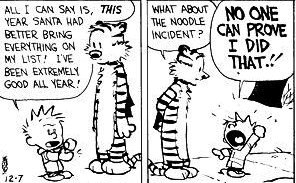Noodle Incidents are one of the most powerful world-building tools you have at your disposal. If you’re unfamiliar with the term, a Noodle Incident is a never-explained event in the past that the characters of a story refer to but never, ever flesh out. The term originated in an old Calvin and Hobbes comic and has been appropriated for literary technique discussion ever since.

Noodle Incidents are fantastic, because they have no limits, no shape, no beginning and no end. You refer to them with a cool, hilarious name, and you let the reader do the heavy lifting of filling in the blanks and shading the corners. Letting the reader do the work is actually the main benefit of Noodle Incidents, as the soaring imagination of your reader will always do a better job of fleshing out your half-baked Noodle Incidents then you will, and peppering your story with them gives the back story and world-building a mysterious, expansive boost you can’t match no matter how good a writer you happen to be.
Once you start using them, however, you have to stick to one Gremlin-like rule: Never explain them.
Day Old Pasta
The power of the Noodle Incident is in its mystery. The urge to explain them grows proportionally to the length of your story, the complexity of your universe, and how long you’ve been writing about a particular group of characters. In other words, the more you write about characters and their environments, the more desperate you can become for new material. And after you’ve told all the main stories, and even the side stories, the Noodle Incidents can start to look an awful lot like whole new veins of story material.
Except, because you’ve invited your readers to imagine them for so long, no matter what you come up with will never be as good as what they’ve come up with. You will lose that war, and losing an imagination war with your readers is not a good look. Let your Noodle Incidents do their work, and find another way to expand your story.
Of course, Noodle Incidents exist in real life. All of mine involve my pants, or lack thereof.

